Sekanabo
By Gorilla Doctors Staff on Tuesday, February 9th, 2010 in Uncategorized.By Drs. Jan and Magda
Last Friday afternoon Gorilla Doctors learned that Sekanabo, an infant male gorilla in Kabirizi group, was caught in a snare. As always in these situations there were many phone calls to the appropriate authorities within ICCN to get permission to attempt intervention if needed. One of the main ICCN Wardens, Innocent, went to the forest to assess the situation and we learned late in the day that little Sekanabo had also sustained a serious wound to his face, likely from the snare. Innocent was able to cut the snare from the bamboo so that Sekanabo could move with the group, but the loop of the snare was still around his ankle. Kabirizi, the main silverback in the group, was quite upset with the situation. Intervention tomorrow could be tricky.
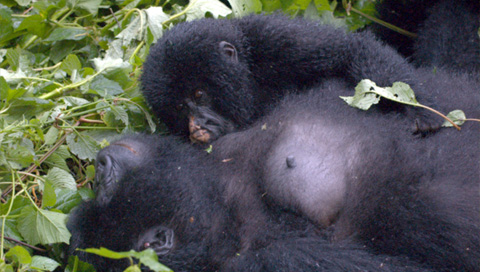 Sekanabo trying to nurse from sleeping Tumaini.
Sekanabo trying to nurse from sleeping Tumaini.
We scrambled to get everything ready so that Drs. Magda and Eddy, along with ICCN veterinarian Dr. Arthur, could go to the field at dawn the next day. The need for intervention was likely. The team of experienced ICCN trackers and Gorilla Doctors left very early in the morning on that rainy Saturday, and despite looking all day, the snared and wounded infant male of Tumaini, was not found. This was very discouraging for the team. His wounds were very serious, and we feared for his life. The team decided to camp that night at Bukima, the ICCN station at the edge of the park, so that they could resume their search on Sunday.
Leaving camp at 6am they found Sekanabo sitting under a thick vine with 2 other infants who were investigating the wound on his face. His mother, Tumaini, gathered him up a bit later and Dr. Magda observed him trying to nurse – this was encouraging to see. But his wounds were significant, and he still had a nylon rope snare that was tight around his ankle. Intervention, meaning anesthesia for little Sekanabo to take off the snare and suture his wounds, was absolutely necessary. Tumaini was holding tight to her sick baby, so Drs. Magda and Eddy loaded 2 darts with the medicine that would make them sleep. The situation was complicated; They had to have two sleeping gorillas to monitor, a complicated surgery to perform in the middle of one of the biggest Virunga gorilla groups, lead by the somewhat aggressive silverback Kabirizi, all the in pouring rain…
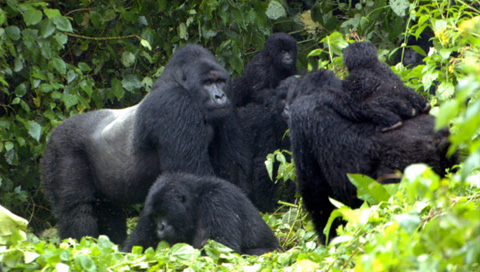 Kabirizi calm but not friendly.
Kabirizi calm but not friendly.
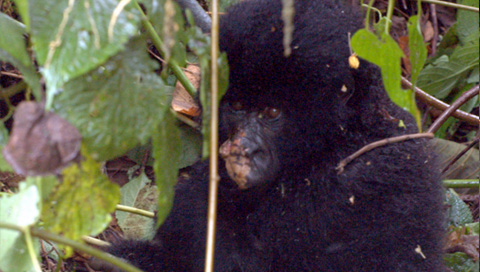 Sekanabo had serious wounds on his face and the snare was tight around his left ankle.
Sekanabo had serious wounds on his face and the snare was tight around his left ankle.
Fortunately the procedure went as well as could be expected. Dr. Eddy skillfully darted Tumaini and she fell asleep in the middle of a clearing, with Sekanabo, only half conscious of his surroundings, clinging to her. Dr. Magda was able to inject the baby once Tumaini was asleep. Fortunately Kabirizi and his group stayed back, watching curiously, but not aggressively, never trying to break the circle of rangers surrounding the sleeping gorillas and Gorilla Doctors, although some of the group did climb trees nearby to get a better view. Now the fight against time started.
Dr. Magda went to work on Sekanabo, while Dr. Eddy monitored both gorillas. Sekanabo’s wound were even more serious than we thought. The upper lip and nostril skin had been torn off, and the underlying tissue of nearly half of Sekanabo’s was exposed. The tissues were not in good condition. After cleaning the wound thoroughly Dr. Magda did the best she could to repair the laceration. She put two layers of stitches to keep the skin and upper lip in place. Though terribly bruised and swollen, Sekanabo’s face again looked like the one of a gorilla.
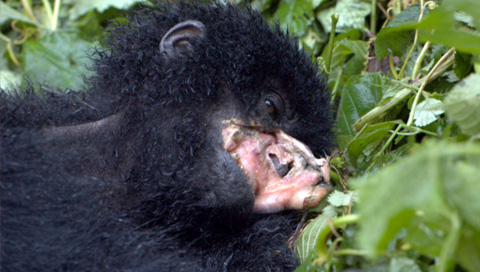 The wound was much worse than expected.
The wound was much worse than expected.
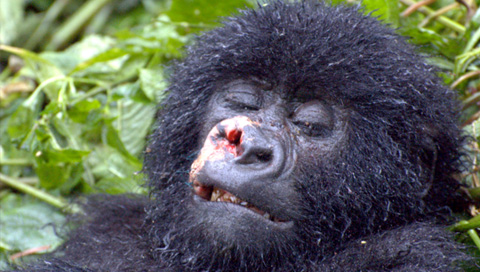 Dr. Magda did her best to suture the tissues closed, hoping he could eat.
Dr. Magda did her best to suture the tissues closed, hoping he could eat.
When Tumaini started waking up the reversal drugs were administered to both mother and son and everyone moved back to observe. The rest of the group approached, surrounding mother and son, and after a while Tumaini walked away, still a bit wobbly from anesthetic. Sekanabo tried to follow, but was he picked up by another female. When she put him down where he rested for about 40 minutes, and finally Tumaini came back and hugged him. The group was excited and were displaying toward the humans and resting Sekanabo. Clearly human presence could only disturb them further. While very, very worried about this little boy, it was time to leave him to the loving care of his group. His snare was removed, his face repaired as much as possible and he had been given a massive dose of antibiotics. There may have been injuries that we could not see externally, but he had been given his best chance to live. Now the difficult time of waiting started.
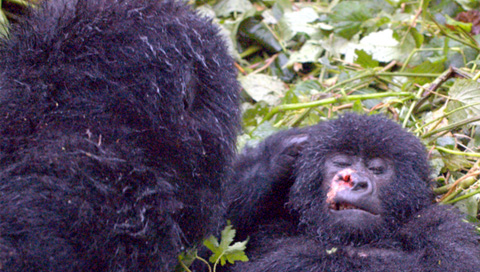 Tumaini woke first and went straight to her still sleeping little boy.
Tumaini woke first and went straight to her still sleeping little boy.
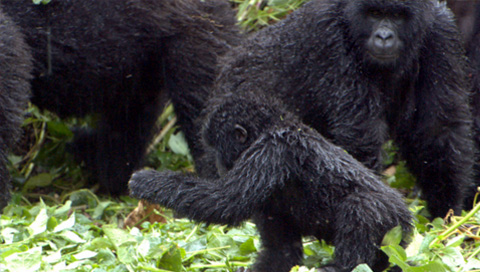 Sekanabo woke up a few minutes later, and moved toward the protection of his family.
Sekanabo woke up a few minutes later, and moved toward the protection of his family.
Drs. Magda, Eddy and Arthur headed home. The equipment needed to be cleaned, drugs replaced, and bags repacked in case another intervention was needed, here or elsewhere. We must always be ready for a crisis like this one. Trackers checked on Sekanabo the next day, as is our protocol in such cases. It is generally not good to have veterinarians go back into the group after an intervention – they have good memories and the last thing we want to do is disturb the group further. We learned about mid day that Sekanabo was weak, but trying to eat. We expected him to be weak after such trauma and an anesthesia, but the fact that he was trying to eat was hopeful news. Unfortunately, later that evening, he was found dead. Tumaini continued to carry him, which is heart breaking. We are all grieving the loss of this little gorilla. But we must stay focused and continue to try to learn from the situation. Trackers will stay with the group and try to recover his broken body so that we can do a necropsy, the animal form of autopsy. It is a difficult but very necessary part of our jobs as Gorilla Doctors.
We did receive some good news that day – Kighoma and Amani are feeling much better now that they are taking their antibiotics well in their milk bottles. Our jobs are such emotional roller coaster rides.
Help the Gorilla Doctors.


 Donate
Donate